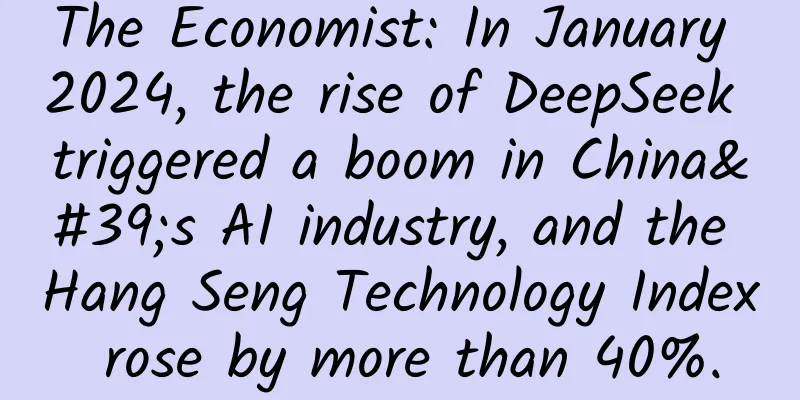The Economist: In January 2024, the rise of DeepSeek triggered a boom in China's AI industry, and the Hang Seng Technology Index rose by more than 40%.

|
The Economist published an article titled "The scale of China's AI boom is astonishing." The article stated that recently, the Chinese AI agent Manus has become popular, and a large number of visitors caused its registration website to crash. Due to the difficulty in handling the traffic, the product is now only available to invitees. Manus is the latest example of the AI boom sweeping China, and the source of all this is DeepSeek, which came out of nowhere in January. In January, DeepSeek shocked the world by offering a training cost that was only a fraction of similar models in the West. This phenomenon has had a huge impact on the Chinese stock market. The Hang Seng Technology Index has risen by more than 40% since mid-January. Hang Seng Technology Index In recent weeks, hundreds of large Chinese companies have said they plan to use DeepSeek’s technology. Although some of China’s tech giants have their own models, they have also embedded DeepSeek into their products, such as Tencent. Currently, municipal governments are integrating DeepSeek’s models into resident service programs. Stock analysts joked that if they wanted their reports to get attention, they had to pitch it from the DeepSeek angle, and investors speculated that the company could single-handedly revive the real estate market in Hangzhou, where DeepSeek is based. Chinese venture capitalists are equally jubilant. A Beijing investor excitedly said that after introducing DeepSeek's technology into the robotics company she invested in, costs were greatly reduced and performance was greatly improved. In this excitement, countless artificial intelligence startups have emerged in China. On March 6, Zheng Zhajie, director of the National Development and Reform Commission, revealed that China is promoting the establishment of a "carrier-level" national venture capital guidance fund, mainly to guide financial capital to invest early, invest in small, invest in the long term, and invest in hard technology. In terms of scale, the fund will attract and drive nearly 1 trillion yuan of local and social capital. China's tech giants, including Alibaba, Baidu, Huawei and Tencent, have all jumped into the frenzy and are hoping to profit from it through their cloud computing divisions. Last month, Alibaba announced that its main goal is to build artificial general intelligence (AGI) that is similar to humans. On March 6, the company released a new reasoning model that it said was as good as DeepSeek. The company has pledged to invest about $53 billion in data center construction over the next three years to meet demand for AI cloud services, an amount that exceeds its investment in the past decade. Alibaba Group holds the leading position in China’s cloud market, with a 36% share. Baidu’s cloud revenue has surged, helping it offset declines in other divisions. Surging demand for AI could also help boost profit margins in China’s cloud computing industry, which tend to be lower than in the West due to fierce competition. HSBC’s Liu Yiran says demand for servers tailored for AI has soared since the end of the Lunar New Year in early February, coinciding with the timing of DeepSeek’s rise . Vendors have begun offering “all-in-one” servers with AI software preinstalled. Many are sold directly to companies, including state-owned enterprises, that want to install servers on their premises for better security. Sangfor Technologies, founded by a group of former Huawei employees, is one of the biggest beneficiaries of the trend: its shares are up about 140% so far this year. Liu Yiran and her team estimate that the all-in-one market will grow by an average of more than 70% a year through 2028. China's AI boom is driving up investment in the country's hardware supply chain. Analysts at investment bank Jefferies said server makers could spend more than 1.4 trillion yuan over the next two years as they expand production capacity. GDS, one of the largest server makers, has expanded its capital spending plans. Rival VNet recently said it would double its production capacity this year. |
<<: With the SSD wave coming, why do people still need a mechanical hard drive?
>>: How long do you have to be away from your phone before you get nervous? Maybe just a few minutes
Recommend
Fitness personal trainer Miao Zhen is content with what he has
Fitness personal trainer Miao Zhen is content and...
How much does it cost to customize a small program in Guangzhou?
In fact, there are ways to develop WeChat applets...
Ground-based economy: the most traditional mode of operation and the most economical mode of attracting new customers
1. Team Building In terms of team building, the c...
A comprehensive B-side design guide: tree selection
Long time no see. In the next few weeks, I will u...
A simple trick to quickly increase your title open rate!
No matter what I say. No matter how good the cont...
First Prize for Primary School Student's Cancer Research Paper Revoked (Attached with Full Notice)
First prize for primary school student's canc...
Summary of common problems in the App Store listing review process
1. Introduction to iOS APP Listing Process Apply ...
Community operation: 5 ways to get to know the community and master it
This article explains in detail the routines from...
Why was the website penalized? What should I do if my website is punished?
A few days ago, I saw someone asking in the group...
How to get official certification on Kuaishou? How to authenticate Kuaishou merchants?
How to apply for official certification v on Kuai...
Yaoyao's "Natural Flow Short Video Tutorial" helps you understand the essence of making natural flow videos more quickly
Introduction to the training course content: This ...
The protagonist of this year's Spring Festival, the zodiac, may be a little misunderstood by us...
It's coming! It's coming! The Year of the...
Compose-Multiplatform Practice on Android and iOS
01 Introduction We have previously discussed KMM,...
Faraday Future uses virtual reality to create FFZERO1 concept car
Faraday Future unveiled its first concept car at ...
Can you make money by just posting your works without doing live streaming? Several ways to make money by posting works on Douyin
The easiest way to monetize Douyin is through liv...









